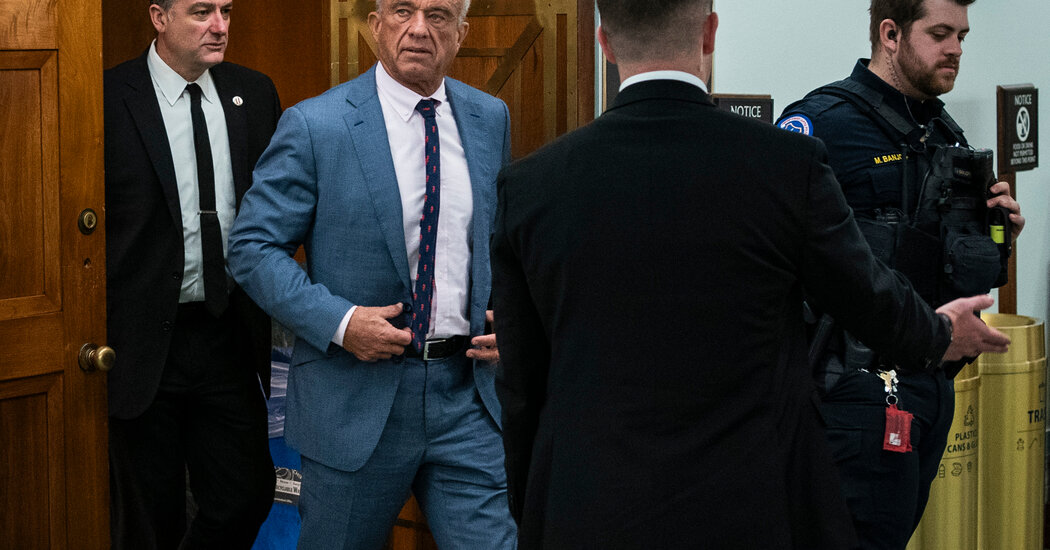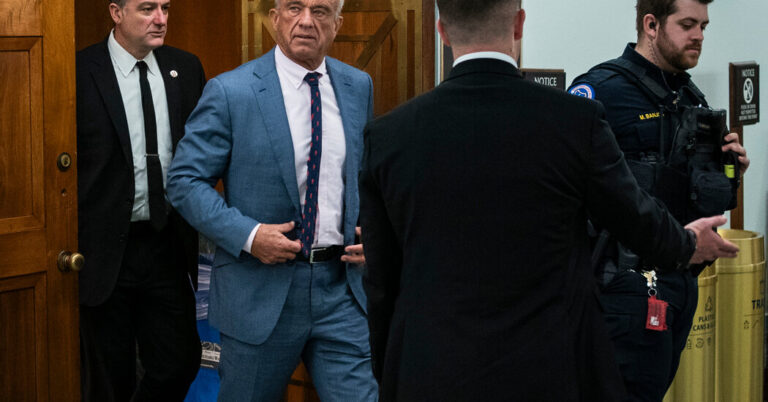The Trump administration, moving quickly to crack down on health and science agencies, canceled a series of scientific meetings and instructed federal health officials to refrain from all public communications, including upcoming reports focused on the nation’s growing avian flu crisis .
Experts serving on external advisory groups on a range of topics from antibiotic resistance to deafness received emails on Wednesday saying their meetings had been cancelled.
The cancellations follow a directive issued Tuesday by the acting director of the federal Department of Health and Human Services, which prohibited the public dissemination of any public communications until reviewed by a presidential appointee or designee, according to federal officials and an internal memo reviewed by The New York Times.
The Directive requires the public publication of “regulations, guidance documents and other public documents and communications”, including any “notices”, “grant announcements”, press releases, conference commitments or official correspondence with public officials, until they have received approval.
The new restriction applies to messages to email groups and social media posts and includes a ban on announcements to the Federal Register, without which many official processes cannot continue. Some warnings sent by the Biden administration in its final week were quickly retracted.
The cancellations and crackdown on communications have chilled employees at the Centers for Disease Control and Prevention and the scientific community at large. The directive was first reported by the Washington Post.
Representatives from the CDC and the Food and Drug Administration declined to comment. The moratorium will last until February 1.
The fallout was immediate.
CDC officials were poised to release an issue of the influential Morbidity and Mortality Weekly Report on Thursday that included several articles related to the growing outbreak of avian influenza on dairy and poultry farms.
The weekly reports have been called the “holiest of holies,” a crucial means of communicating about public health developments. This week’s publication is now blocked because of the order, according to two federal health officials who spoke on condition of anonymity because they were not authorized to speak publicly.
Upcoming meetings of external advisory groups on health issues have been cancelled, according to members of the group, who spoke anonymously for fear of retaliation. For example, meetings to review grant proposals submitted to the National Institutes of Health have been canceled.
Members of the Presidential Advisory Council on Combating Antibiotic-Resistant Bacteria were told that their two-day meeting, scheduled for next Tuesday and Wednesday, had been canceled “as the new administration considers its plan for managing federal policy and public communications”.
Those who had registered in advance for a celebratory dinner were told they would be “fully refunded within 48 hours” of receiving the email.
The directive was signed by Dr. Dorothy Fink, acting secretary of the Department of Health and Human Services. The confirmation hearing for Robert F. Kennedy Jr., who President Trump nominated to lead the department, is not expected for at least another week.
The administration has yet to name an acting director of the CDC or an acting commissioner of the Food and Drug Administration, usually among the first moves of an incoming administration.
The pause in communications accompanies a number of other changes faced by federal employees since Trump took office on Monday, including a hiring freeze, an end to remote work and the closing of diversity, equity and diversity offices and programs. ‘inclusion.
Late Wednesday, Dr. Fink issued another directive aimed at ending diversity and inclusion efforts at HHS and warned against attempting to “disguise these programs using coded or imprecise language.” His letter also encouraged employees to report colleagues who did not comply.
Former federal officials said it was not unusual for a new administration to limit communication during the initial transition, but the scope and duration of the latest pause was unexpected.
Staff members in the new Trump administration did not use the transition period to meet with federal health officials and familiarize themselves with the agencies.
And while a lull in communications is not unusual, previous administrations have not restricted scientific publications like the MMWR or health guidelines because of their critical importance to public well-being.
“It’s not unusual for a new administration to want to centralize communications,” said Dr. Richard Besser, CEO of the Robert Wood Johnson Foundation and former acting director of the CDC
“It is unusual to suspend all communications from an agency where one of its core responsibilities is to keep the public informed,” he added.
Privately, several federal officials said they were confused about whether the restriction on communications with the Federal Register included health data. Some officials appeared unaware of the restrictions.
Much of the concern centered on the CDC, whose responsibilities certainly include public communications. The agency, for example, recently raised awareness among doctors and patients about potential health risks from an emerging version of the disease and an outbreak of Marburg disease in Rwanda.
The agency offered findings on the pandemic’s effects on the mental health of health care workers and new guidelines that extend the recommendation for pneumococcal vaccines, and warned of an increase in the incidence of tularemia, a rare infectious disease, in the U.S. .
State and city health officials rely on CDC advisories to make decisions for their communities, such as when to ramp up flu testing or which disease symptoms to watch for, said Chrissie Juliano, executive director of the Big Cities Health Coalition, representing leaders of urban public health departments.
While much of this information may be delayed by a few days, he said he hopes the administration has a plan to disseminate more urgent public health information, especially In related to the avian influenza epidemic.
Last year, the avian influenza virus, called H5N1, affected dozens of animal species and more than 35 million wild and commercial birds, causing soaring egg prices. It has also infected at least 67 people; in December the country recorded its first human death related to avian influenza.
“Can something like bird flu come on suddenly in 10 days?” Ms. Juliano said. “YES. I hope that if these signs are seen at the federal level, information will leak out.”
Dr. Ashish Jha, dean of the Brown University School of Public Health and the Biden administration’s former Covid czar, said the lull in communications was most likely the product of the Trump administration’s “particularly bumpy” transition to the White House, rather than a coordinated action. effort to retain information.
However, public health experts are wary of any changes to access to federal health data. Memories of Trump’s last term, during which political appointees repeatedly meddled with CDC reports and falsified guidance documents, are still raw.
“I think if it goes beyond February 1, then we have a much more serious problem,” Dr. Jha said.





